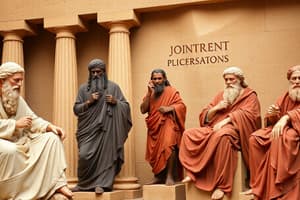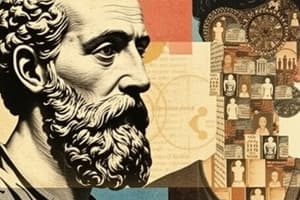Podcast
Questions and Answers
What is the Greek term for philosophy and what does it mean?
What is the Greek term for philosophy and what does it mean?
- Philos, meaning 'thinking critically'
- Philosophia, meaning 'love of wisdom' (correct)
- Sophia, meaning 'search for truth'
- Philosophia, meaning 'study of knowledge'
According to Karl Jaspers, why do individuals engage in philosophy?
According to Karl Jaspers, why do individuals engage in philosophy?
- To formulate mathematical principles
- To navigate difficult life experiences (correct)
- To discover empirical truths
- To escape from societal norms
Which of the following best describes reflective practice in philosophy?
Which of the following best describes reflective practice in philosophy?
- An uncritical acceptance of beliefs
- A way of imposing one’s views on others
- A process of examining thoughts, feelings, and actions (correct)
- A method for achieving external validation
What is the primary difference between holistic and partial thinking?
What is the primary difference between holistic and partial thinking?
What does epistemology primarily study within the realm of philosophy?
What does epistemology primarily study within the realm of philosophy?
What is one main reason individuals might engage in philosophy according to Rene Descartes?
What is one main reason individuals might engage in philosophy according to Rene Descartes?
What does holistic thinking emphasize when approaching a problem?
What does holistic thinking emphasize when approaching a problem?
Which Greek philosopher is most associated with the idea that philosophy arises from a sense of wonder?
Which Greek philosopher is most associated with the idea that philosophy arises from a sense of wonder?
Which of the following best describes an internal question in philosophy?
Which of the following best describes an internal question in philosophy?
What is an important practical use of philosophy?
What is an important practical use of philosophy?
What does reflection in philosophical practice involve?
What does reflection in philosophical practice involve?
What characterizes partial thinking in comparison to holistic thinking?
What characterizes partial thinking in comparison to holistic thinking?
Which branch of philosophy studies the principles that govern politics?
Which branch of philosophy studies the principles that govern politics?
What does the term 'aesthetics' refer to within philosophical discussions?
What does the term 'aesthetics' refer to within philosophical discussions?
What is meant by 'analyzing framework' in philosophical terms?
What is meant by 'analyzing framework' in philosophical terms?
Flashcards are hidden until you start studying
Study Notes
Greek Philosophers
- Pythagoras: Known for contributions to mathematics, particularly the Pythagorean theorem.
- Heraclitus: Emphasized the concept of change being central to the universe; famous for the phrase "everything flows."
- Democritus: Proposed that all matter is made up of atoms, introducing an early atomic theory.
- Diogenes: A prominent figure in Cynicism, advocating for a life in accordance with nature and virtue over societal norms.
- Epicurus: Focused on the pursuit of happiness through the enjoyment of simple pleasures and seeks to avoid pain.
- Socrates: Initiated the Socratic method of questioning to stimulate critical thinking and illuminate ideas.
- Plato: A student of Socrates, he wrote extensively on a range of topics, including ideal forms, knowledge, and justice.
- Aristotle: Developed a comprehensive system of Western philosophy covering ethics, politics, metaphysics, and natural sciences.
Reasons to Philosophize
- Sense of Wonder: Inspires deeper inquiry and exploration of existence and the universe.
- Doubt: Encourages critical thinking by questioning assumptions and beliefs.
- Experience: Utilizes personal life experiences to gain insight and understand complex situations.
- Love of Wisdom: Represents the intrinsic desire to seek understanding and knowledge.
Practical Uses of Philosophy
- Critical Analysis: Enhances one’s ability to assess arguments and interpret various viewpoints.
- Problem Solving: Improves decision-making capabilities through structured thinking.
- Communication Skills: Philosophers articulate complex ideas clearly and persuasively.
- Self Development: Promotes personal growth and self-awareness through reflective practices.
Definitions
- Internal vs External: Internal questions relate to personal beliefs and values while external questions focus on broader societal or universal issues.
- Analyzing Framework: Refers to a structured approach for understanding the world shaped by personal views and beliefs.
- Aesthetics: The study of beauty, art, and taste and their appreciation.
- Epistemology: The branch of philosophy concerned with knowledge, its nature, sources, and limits.
- Political Philosophy: Explores concepts of justice, rights, and the ideal state; examines the role of individuals and institutions in society.
- Metaphysics: Investigates the fundamental nature of reality, including the relationship between mind and matter.
- Holistic vs Partial Thinking: Holistic thinking looks at the "big picture," whereas partial thinking focuses on specific elements of a situation.
- Reflection: Analyzing one's thoughts, feelings, and actions to gain insight from experiences.
Review Notes
- Philosophy is a discipline that utilizes human reasoning to explore the ultimate reasons and principles governing existence.
- The term philosophy originates from the Greek "philosophia," meaning "love of wisdom."
- Plato posited that wonder drives individuals to engage in philosophical inquiry.
- Karl Jaspers emphasized philosophy's role in helping individuals navigate challenging life experiences.
- René Descartes regarded doubt as a key motivating factor for philosophical thought.
- A framework represents a personal lens through which to view and interpret the world.
- Internal questions critically examine personal beliefs, while external questions explore societal constructs.
- Reflection involves assessing thoughts and emotions to learn from experiences.
- Holistic thinking embodies a comprehensive view, while partial thinking hones in on specific aspects of a scenario.
Greek Philosophers
- Pythagoras: Known for contributions to mathematics, particularly the Pythagorean theorem.
- Heraclitus: Emphasized the concept of change being central to the universe; famous for the phrase "everything flows."
- Democritus: Proposed that all matter is made up of atoms, introducing an early atomic theory.
- Diogenes: A prominent figure in Cynicism, advocating for a life in accordance with nature and virtue over societal norms.
- Epicurus: Focused on the pursuit of happiness through the enjoyment of simple pleasures and seeks to avoid pain.
- Socrates: Initiated the Socratic method of questioning to stimulate critical thinking and illuminate ideas.
- Plato: A student of Socrates, he wrote extensively on a range of topics, including ideal forms, knowledge, and justice.
- Aristotle: Developed a comprehensive system of Western philosophy covering ethics, politics, metaphysics, and natural sciences.
Reasons to Philosophize
- Sense of Wonder: Inspires deeper inquiry and exploration of existence and the universe.
- Doubt: Encourages critical thinking by questioning assumptions and beliefs.
- Experience: Utilizes personal life experiences to gain insight and understand complex situations.
- Love of Wisdom: Represents the intrinsic desire to seek understanding and knowledge.
Practical Uses of Philosophy
- Critical Analysis: Enhances one’s ability to assess arguments and interpret various viewpoints.
- Problem Solving: Improves decision-making capabilities through structured thinking.
- Communication Skills: Philosophers articulate complex ideas clearly and persuasively.
- Self Development: Promotes personal growth and self-awareness through reflective practices.
Definitions
- Internal vs External: Internal questions relate to personal beliefs and values while external questions focus on broader societal or universal issues.
- Analyzing Framework: Refers to a structured approach for understanding the world shaped by personal views and beliefs.
- Aesthetics: The study of beauty, art, and taste and their appreciation.
- Epistemology: The branch of philosophy concerned with knowledge, its nature, sources, and limits.
- Political Philosophy: Explores concepts of justice, rights, and the ideal state; examines the role of individuals and institutions in society.
- Metaphysics: Investigates the fundamental nature of reality, including the relationship between mind and matter.
- Holistic vs Partial Thinking: Holistic thinking looks at the "big picture," whereas partial thinking focuses on specific elements of a situation.
- Reflection: Analyzing one's thoughts, feelings, and actions to gain insight from experiences.
Review Notes
- Philosophy is a discipline that utilizes human reasoning to explore the ultimate reasons and principles governing existence.
- The term philosophy originates from the Greek "philosophia," meaning "love of wisdom."
- Plato posited that wonder drives individuals to engage in philosophical inquiry.
- Karl Jaspers emphasized philosophy's role in helping individuals navigate challenging life experiences.
- René Descartes regarded doubt as a key motivating factor for philosophical thought.
- A framework represents a personal lens through which to view and interpret the world.
- Internal questions critically examine personal beliefs, while external questions explore societal constructs.
- Reflection involves assessing thoughts and emotions to learn from experiences.
- Holistic thinking embodies a comprehensive view, while partial thinking hones in on specific aspects of a scenario.
Studying That Suits You
Use AI to generate personalized quizzes and flashcards to suit your learning preferences.




